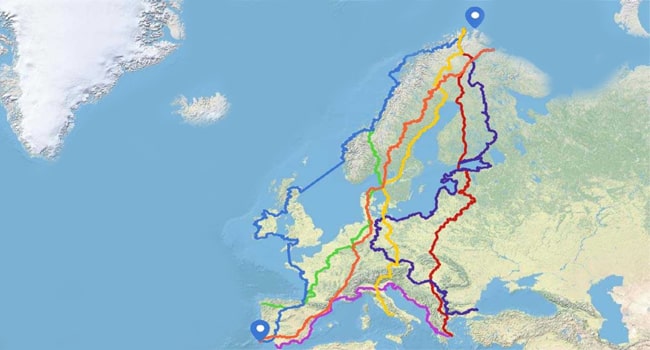Most Dangerous Illegal Ways Or Routes To Europe
The perilous journey to Europe through illegal means is a complex issue marked by life-threatening challenges and criminal activities. Understanding the motivations behind individuals opting for such dangerous routes is crucial to addressing the broader issue.
Motivations Behind Risky Migration
Desperation, lack of legal options, and the pursuit of a better life drive many to take unimaginable risks. Examining the motivations sheds light on the human side of the migration crisis.
The Perils of Sea Routes
Treacherous Mediterranean Crossings
Migrants often brave the treacherous waters of the Mediterranean Sea in overcrowded and unseaworthy vessels. The risks of capsizing, drowning, and exposure are alarmingly high.
Smuggling and Human Trafficking Networks
Sophisticated criminal networks exploit the vulnerable, providing false promises of safe passage. The involvement of human traffickers exacerbates the dangers migrants face during sea crossings.
Overland Journeys Through Conflict Zones
Dangers of Cross-Border Movements
Overland routes through conflict zones present their own set of dangers. Migrants navigate through regions marked by violence, political instability, and a lack of basic services.
Risks Associated with Human Traffickers
Human traffickers often exploit the desperation of migrants, leading them through perilous routes with little regard for their safety. Kidnappings, violence, and extortion are common occurrences.
The Role of Unsafe Transport
Cramped Vehicles and Overcrowded Conditions
Migrants on overland routes often find themselves packed into cramped vehicles, enduring uncomfortable and hazardous conditions for extended periods.
Lack of Sanitation and Healthcare
The absence of proper sanitation facilities and healthcare exacerbates the health risks faced by migrants on illegal routes. Diseases and infections spread quickly in these crowded and unsanitary environments.
Evading Authorities: Challenges and Consequences
Cat-and-Mouse Games with Law Enforcement
Migrants on illegal routes engage in a constant game of cat-and-mouse with law enforcement. Evading authorities becomes a daily struggle, adding stress and danger to their journey.
Detention and Deportation Risks
Those caught in transit face the risk of detention and subsequent deportation. This adds another layer of uncertainty and fear to the already dangerous journey.
Impact on Vulnerable Populations
Women and Children at Higher Risk
Women and children, in particular, face heightened risks during illegal migration. They are susceptible to exploitation, abuse, and trafficking.
Exploitation of Refugees and Asylum Seekers
The vulnerable status of refugees and asylum seekers is exploited by criminals, leading to situations of human trafficking, forced labor, and other forms of exploitation.
International Efforts and Policies
Addressing Root Causes of Migration
International collaboration is essential to address the root causes of migration. Tackling issues such as poverty, political instability, and conflict contributes to long-term solutions.
Collaborative Approaches to Combat Illegal Routes
Countries must work together to dismantle human trafficking networks and strengthen border controls. Collaborative efforts can disrupt illegal routes and protect potential victims.
Humanitarian Perspectives
Non-Governmental Organizations’ Interventions
Non-Governmental Organizations (NGOs) play a crucial role in providing humanitarian aid along these routes. Their interventions aim to alleviate immediate suffering and offer support to vulnerable migrants.
Providing Support and Safe Alternatives
Promoting legal and safe alternatives to migration is vital. Offering support for asylum applications, resettlement programs, and international protection can address the humanitarian aspects of the crisis.
Legal Ramifications
Consequences for Human Traffickers
Legal frameworks need to be robust to prosecute human traffickers and those involved in facilitating illegal migration. Strict consequences act as a deterrent to criminal activities.
Challenges in Prosecuting Illegal Routes
The transnational nature of illegal migration poses challenges in prosecuting individuals involved. International cooperation is essential to overcome legal obstacles and ensure justice.
Media Coverage and Awareness
Shedding Light on the Human Stories
Media plays a crucial role in raising awareness about the human stories behind illegal migration. Responsible reporting can influence public opinion and encourage governments to take action.
The Importance of Responsible Reporting
Responsible reporting involves highlighting the complexities of the migration crisis without sensationalizing. Focusing on human experiences fosters empathy and understanding.
Addressing the Global Migration Crisis
Advocacy for Safer Migration Policies
Advocacy for safer migration policies is essential. Balancing security concerns with humanitarian considerations can contribute to more comprehensive and effective solutions.
Balancing Security and Humanitarian Concerns
Finding a delicate balance between security measures and humanitarian concerns is critical. Policymakers must address both aspects to create sustainable solutions to the global migration crisis.
Conclusion
The exploration of the most dangerous illegal routes to Europe unveils a complex and deeply rooted issue. While addressing the immediate dangers is crucial, a comprehensive approach involving international cooperation, humanitarian efforts, and responsible reporting is necessary to create lasting solutions.
Get Access Now: https://bit.ly/J_Umma
FAQs – Understanding the Illegal Migration Landscape
Q: Why do migrants choose dangerous illegal routes instead of legal options?
-
- A: Limited legal options, desperation for a better life, and lack of access to proper channels often drive migrants to opt for dangerous routes.
Q: How can international collaboration address the root causes of migration?
-
- A: International collaboration can address root causes by tackling issues like poverty, political instability, and conflict through joint efforts and initiatives.
Q: What role do NGOs play in supporting migrants along dangerous routes?
-
- A: NGOs provide humanitarian aid, support, and advocacy for migrants. They aim to alleviate immediate suffering and offer alternatives to dangerous routes.
Q: What challenges do law enforcement agencies face in prosecuting individuals involved in illegal migration?
-
- A: The transnational nature of illegal migration poses challenges in collecting evidence and enforcing laws. International cooperation is crucial to overcome these challenges.
Q: How can responsible media reporting contribute to addressing the migration crisis?
-
- A: Responsible media reporting can foster understanding by highlighting the human stories behind migration without sensationalizing. This contributes to informed public discourse and policymaking.

